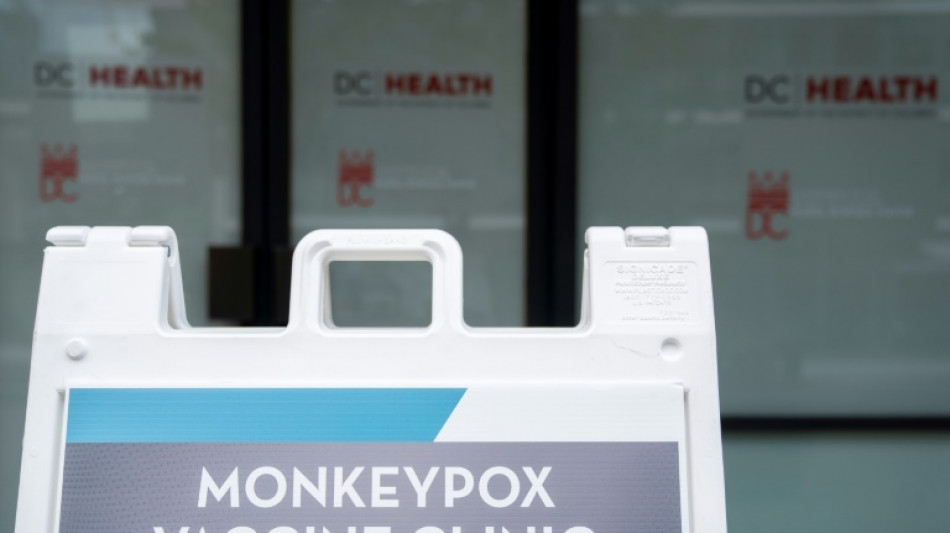
-
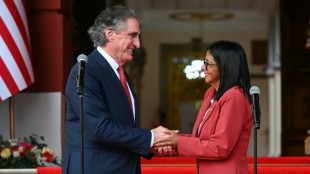 US says Venezuela to protect mining firms as diplomatic ties restored
US says Venezuela to protect mining firms as diplomatic ties restored
-
Trump honors Messi and MLS Cup champion Miami teammates

-
 Dismal Spurs can still avoid relegation vows Tudor
Dismal Spurs can still avoid relegation vows Tudor
-
Berger sets early pace at Arnold Palmer with 'unbelievable' 63

-
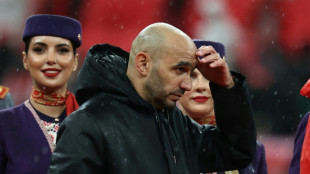 Morocco part company with coach Regragui as World Cup looms
Morocco part company with coach Regragui as World Cup looms
-
Lens beat Lyon on penalties to reach French Cup semis

-
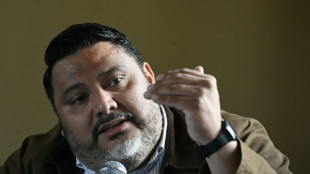 El Salvador's Bukele holding dozens of political prisoners: rights group
El Salvador's Bukele holding dozens of political prisoners: rights group
-
With Iran war, US goes it alone like never before
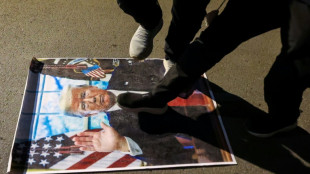
-
 Spurs slip deeper into relegation trouble after loss to Palace
Spurs slip deeper into relegation trouble after loss to Palace
-
European, US stocks back in sell-off mode as oil prices surge

-
 Pete Hegseth: Trump's Iran war attack dog
Pete Hegseth: Trump's Iran war attack dog
-
Celtics' Tatum could make injury return on Friday

-
 'Enemy at home': Iranian authorities tighten grip as war rages
'Enemy at home': Iranian authorities tighten grip as war rages
-
Bethell set for 'hell of a career', says England captain Brook

-
 France coach Galthie slams Scotland for 'smallest changing room in the world'
France coach Galthie slams Scotland for 'smallest changing room in the world'
-
Medvedev arrives in Indian Wells after being stranded in Dubai

-
 Trump fires homeland security chief Kristi Noem
Trump fires homeland security chief Kristi Noem
-
Mideast war risks pulling more in as conflict boils over

-
 Wales' James Botham 'sledged' by grandfather Ian Botham after Six Nations error
Wales' James Botham 'sledged' by grandfather Ian Botham after Six Nations error
-
India hero Samson eyes 'one more' big knock in T20 World Cup final

-
 Britney Spears detained on suspicion of driving while intoxicated
Britney Spears detained on suspicion of driving while intoxicated
-
Grooming makes Crufts debut as UK dog show widens offer

-
 Townsend insists Scots' focus solely on France not Six Nations title race
Townsend insists Scots' focus solely on France not Six Nations title race
-
UK sends more fighter jets to Gulf: PM

-
 EU to ban plant-based 'bacon' but veggie 'burgers' survive chop
EU to ban plant-based 'bacon' but veggie 'burgers' survive chop
-
Leagues Cup to hold matches in Mexico for first time

-
 India reach T20 World Cup final after England fail in epic chase
India reach T20 World Cup final after England fail in epic chase
-
Conservative Anglicans press opposition to Church's first woman leader

-
 Iran players sing anthem and salute at Women's Asian Cup
Iran players sing anthem and salute at Women's Asian Cup
-
India beat England in high-scoring T20 World Cup semi-final

-
 Mideast war traps 20,000 seafarers, 15,000 cruise passengers in Gulf
Mideast war traps 20,000 seafarers, 15,000 cruise passengers in Gulf
-
Italy bring back Brex to face England

-
 French policeman to be tried over 2023 killing of teen
French policeman to be tried over 2023 killing of teen
-
Oil prices rise, stocks slide as Middle East war stirs supply concerns

-
 More flights take off despite continued fighting in Middle East
More flights take off despite continued fighting in Middle East
-
Ukraine, Russia free 200 POWs each

-
 Middle East war halts work at WHO's Dubai emergency hub
Middle East war halts work at WHO's Dubai emergency hub
-
Paramount's Ellison vows CNN editorial independence

-
 US says attacks on alleged drug boats have spooked traffickers
US says attacks on alleged drug boats have spooked traffickers
-
Dempsey returns as Scotland shuffle pack for Six Nations clash against France

-
 India pile up 253-7 against England in T20 World Cup semi-final
India pile up 253-7 against England in T20 World Cup semi-final
-
Wary Europeans pledge 'defensive' military aid in Mideast war

-
 Seven countries to boycott Paralympics ceremony over Russia: organisers
Seven countries to boycott Paralympics ceremony over Russia: organisers
-
UK's Crufts dog show opens with growing global appeal

-
 PSG prepare for Chelsea clash with Monaco rematch
PSG prepare for Chelsea clash with Monaco rematch
-
Google opens AI centre as Berlin defends US tech reliance

-
 Second Iranian ship nears Sri Lanka after submarine attack
Second Iranian ship nears Sri Lanka after submarine attack
-
Portugal mourns acclaimed writer Antonio Lobo Antunes

-
 Union loses fight against Tesla at German factory
Union loses fight against Tesla at German factory
-
Wales revel in being the underdogs, says skipper Lake


Studies to see if mutations behind monkeypox spread: WHO
Studies are under way to see whether genetic changes in the monkeypox virus are driving the rapid spread of the disease, the World Health Organization told AFP on Wednesday.
The two distinct clades, or variants, of the virus were called the Congo Basin (Central African) and West African clades, after the two regions where they are each endemic.
On Friday, the WHO renamed the groupings as Clade I and Clade II respectively, to avert the risk of geographic stigmatisation.
It also announced that Clade II had two sub-clades, IIa and IIb, with viruses within the latter identified as being behind the the current global outbreak.
On Wednesday, the UN health agency specified that Clades IIa and IIb are related and share a recent common ancestor -- therefore IIb is not an offshoot of IIa.
- Research into mutations -
Clade IIb contains viruses collected in the 1970s, and from 2017 onwards.
"Looking through the genome, indeed there are a few genetic differences between the viruses from the current outbreak and the older Clade IIb viruses," the WHO told AFP.
"However, nothing is known about the significance of these genetic changes, and research is ongoing to establish the effects (if any) of these mutations on transmission and disease severity.
"It is still early on in both the outbreak and laboratory studies to tell if the rise in infections could be driven by the observed genotypic changes in the virus, or are due to host (human) factors."
There is also no information yet on what the mutations mean in terms of how the virus interacts with the human immune response.
A surge in monkeypox infections has been reported since early May outside the endemic African countries.
The WHO declared the situation an international public health emergency on July 23.
More than 35,000 cases in 92 countries, and 12 deaths, have now been reported to the WHO.
Almost all new cases are being reported from Europe and the Americas.
Experts have been studying samples from cases.
"The diversity between the viruses responsible for the current outbreak is minimal, and there is no obvious genotypic differences between the viruses from the non-endemic countries," the WHO said.
- Renaming monkeypox could take months -
Meanwhile the WHO said its drive to rename monkeypox could take "a number of months".
The organisation has for weeks voiced concern about the name, with experts concerned that it is misleading.
Monkeypox received its name because the virus was originally identified in monkeys kept for research in Denmark in 1958.
However, the disease is found most frequently in rodents, and the current outbreak is being spread through human-to-human close contact.
The WHO has called for help from the public in coming up with a new name, with a dedicated website where anyone can make suggestions.
"We will update the public by the end of the year," the WHO said.
O.Lorenz--BTB



